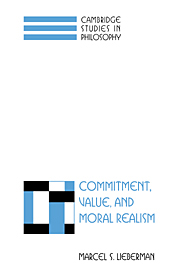Summary
RORTY AND GIBBARD REVISITED
The examination of commitment began with a dual challenge on the part of Rorty and Gibbard that realist or factualist accounts of commitment were either false or irrelevant: they both claimed to be able to explain such things as solidarity and normative governance without the benefit of realist evaluative beliefs – beliefs which aim at objectivity and purport to represent subject-independent facts. The arguments that followed were driven by the need to respond to their challenge: to limn the outline of commitment in order to reach a more informed position from which to assess their neopragmatist and norm-expressivist views.
Richard Rorty
The central question regarding Rorty's neopragmatist portrayal of the liberal ironist was whether it was in fact a human portrait or the portrait of some impossible hybrid Rorty calls the strong poet, a portrait more suited to the pages of fiction than an account of a possible human morality. We can now answer definitively that Rorty does not provide a plausible psychological picture of what it is to be a liberal ironist: one who believes that inflicting cruelty is the worst thing one can do, and at the same time has no beliefs regarding the human essence, the human good, or human nature.
Through the examination of the intention-like commitments and later the substantive commitments, of which solidarity forms a part, we saw how beliefs are functionally required for commitment to satisfy its roles in the guidance of action, self-understanding, and identity, and how these beliefs provided the stability of commitment and served as criteria for revision.
Information
- Type
- Chapter
- Information
- Commitment, Value, and Moral Realism , pp. 183 - 198Publisher: Cambridge University PressPrint publication year: 1998
